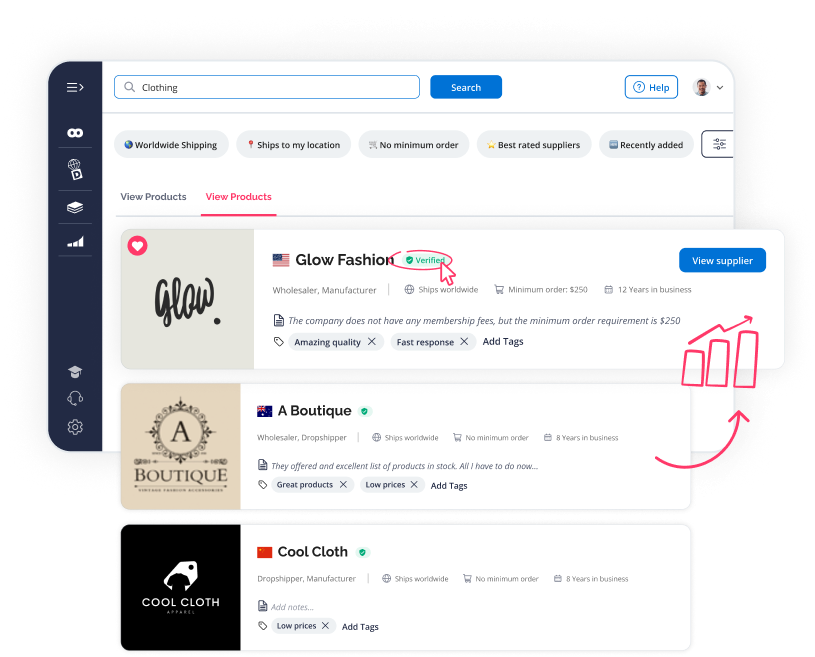Find Wholesale Lubricants for Your Online Store
When sourcing lubricants, your business opens the door to a vital segment of the automotive, industrial, and personal care markets, where high-quality products are essential for performance and safety. With a diverse range of options—ranging from industrial-grade lubricants to eco-friendly personal lubricants—it's crucial to consider factors such as efficacy, formulation, and compliance with safety regulations. Always vet suppliers for manufacturing standards and product certifications to ensure you're offering only the best to your customers

Here’s a selection of suppliers waiting for your call
Wholesale Supplier
 Verified
Verified
 Join to contact this supplier
Join to contact this supplier
 No Minimum Order
No Minimum Order
 19 Years in SaleHoo
19 Years in SaleHoo
Products stocked
About
Wholesale Supplier
 Verified
Verified
 Join to contact this supplier
Join to contact this supplier
 No Minimum Order
No Minimum Order
 18 Years in SaleHoo
18 Years in SaleHoo
Products stocked
About
Manufacturer Supplier
 Verified
Verified
 Join to contact this supplier
Join to contact this supplier
 No Minimum Order
No Minimum Order
 5 Years in SaleHoo
5 Years in SaleHoo
Products stocked
About
Wholesale Supplier
 Verified
Verified
 Join to contact this supplier
Join to contact this supplier
 No Minimum Order
No Minimum Order
 13 Years in SaleHoo
13 Years in SaleHoo
Products stocked
About
Manufacturer Supplier
 Verified
Verified
 Join to contact this supplier
Join to contact this supplier
 No Minimum Order
No Minimum Order
 5 Years in SaleHoo
5 Years in SaleHoo
Products stocked
About
Manufacturer Supplier
 Verified
Verified
 Join to contact this supplier
Join to contact this supplier
 No Minimum Order
No Minimum Order
 37 Years in SaleHoo
37 Years in SaleHoo
Products stocked
About
Manufacturer Supplier
 Verified
Verified
 Join to contact this supplier
Join to contact this supplier
 No Minimum Order
No Minimum Order
 26 Years in SaleHoo
26 Years in SaleHoo
Products stocked
About
Manufacturer Supplier
 Verified
Verified
 Join to contact this supplier
Join to contact this supplier
 No Minimum Order
No Minimum Order
 14 Years in SaleHoo
14 Years in SaleHoo
Products stocked
About
Wholesale Supplier
 Verified
Verified
 Join to contact this supplier
Join to contact this supplier
 No Minimum Order
No Minimum Order
 25 Years in SaleHoo
25 Years in SaleHoo
Products stocked
About
Manufacturer Supplier
 Verified
Verified
 Join to contact this supplier
Join to contact this supplier
 No Minimum Order
No Minimum Order
 27 Years in SaleHoo
27 Years in SaleHoo
Products stocked
About
Other product suppliers available...
Trusted by 137,000+ entrepreneurs worldwide

7-day trial today
suppliers in the USA and internationally.
Frequently Asked Questions
Look for suppliers with ISO certifications, particularly ISO 9001 for quality management and ISO 14001 for environmental management. Additionally, suppliers should comply with industry-specific standards like the FDA for food-grade lubricants or API guidelines for automotive lubricants.
The formulation of lubricants is influenced by base oil types, additives, and the specific performance requirements of the application. Factors like viscosity, temperature stability, and load-carrying capacity are critical in determining the right formulation.
Request material safety data sheets (MSDS) and technical data sheets (TDS) for detailed information on composition and performance. Conduct independent lab tests or evaluations to assess viscosity, wear protection, and thermal stability of the lubricants before making a selection.
MOQs can vary significantly based on the supplier's production capabilities, ranging from as low as 100 liters for niche products to several tons for bulk orders. Always clarify the MOQ in advance to ensure it aligns with your business needs.
Common additive types include anti-wear agents, detergents, dispersants, and viscosity index improvers. These additives enhance performance characteristics such as reducing friction, keeping contaminants suspended, and improving temperature stability.


